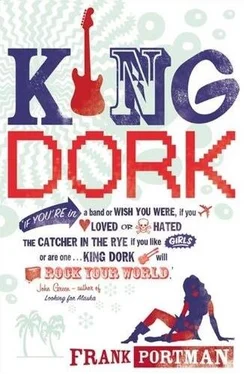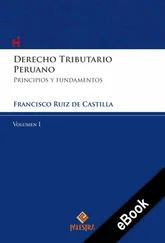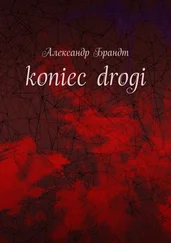Frank Portman - King Dork
Здесь есть возможность читать онлайн «Frank Portman - King Dork» весь текст электронной книги совершенно бесплатно (целиком полную версию без сокращений). В некоторых случаях можно слушать аудио, скачать через торрент в формате fb2 и присутствует краткое содержание. Жанр: Старинная литература, на английском языке. Описание произведения, (предисловие) а так же отзывы посетителей доступны на портале библиотеки ЛибКат.
- Название:King Dork
- Автор:
- Жанр:
- Год:неизвестен
- ISBN:нет данных
- Рейтинг книги:4 / 5. Голосов: 1
-
Избранное:Добавить в избранное
- Отзывы:
-
Ваша оценка:
- 80
- 1
- 2
- 3
- 4
- 5
King Dork: краткое содержание, описание и аннотация
Предлагаем к чтению аннотацию, описание, краткое содержание или предисловие (зависит от того, что написал сам автор книги «King Dork»). Если вы не нашли необходимую информацию о книге — напишите в комментариях, мы постараемся отыскать её.
King Dork — читать онлайн бесплатно полную книгу (весь текст) целиком
Ниже представлен текст книги, разбитый по страницам. Система сохранения места последней прочитанной страницы, позволяет с удобством читать онлайн бесплатно книгу «King Dork», без необходимости каждый раз заново искать на чём Вы остановились. Поставьте закладку, и сможете в любой момент перейти на страницу, на которой закончили чтение.
Интервал:
Закладка:
The Bible passage brought to mind my first response to the note, the Rosemary’s Baby/ Black Sabbath–influenced idea that it had something to do with burning witches. Was there something in that after all? I mean, maybe Tit was implying that Timothy J. Anderson had been some kind of heretic, through a (devil-head) oblique and maybe ironic reference to a biblical text about burning trees and vipers and questioning authority? I really wished I knew more about history, religion, the Bible, witches, the sixties, and so forth. My Academic Achievements were second to none, yet somehow I instinctively knew I wasn’t going to solve this particular problem by making a collage or appreciating ethnic food or putting on a 203
skit. In fact, I felt severely handicapped by my lack of knowledge in general, which is not something that comes up very often in my day-to-day life. Or more likely it comes up all the time without my realizing it.
We had discovered something potentially meaningful, yet I didn’t get much satisfaction from it. Part of that was because solving one puzzle had simply opened a new set of puzzles, and vaguer ones at that, and I was more confused than ever.
But mostly, it was because the whole thing gave me an uncomfortable, creepy feeling. Tit’s note was creepy. The Bible passage was creepy. It wasn’t what I had been going for with this cute little hobby of trying to investigate my dad’s teenage life through clues he had inadvertently left behind. I looked down at all of our research materials spread out on the table: Catcher, CEH 1960; the note from Tit; The Seven Storey Mountain; the Jerusalem Bible; the concordance; my French dictionary; my various notebooks—I could almost see and feel them morph from charming-exhilarating-profound to sordid-depressing-pointless. For some reason the phrase “brood of vipers” kept echoing unpleasantly in my head. I had this idi-otic notion that the materials spread out on the table formed a kind of picture of the world, and that it wasn’t a picture I particularly cared for. And my dad’s role in this picture was maddeningly dim and indistinct.
I had once again been distracted from the investigation by my own fantasies and emotions. Not Sam Hellerman, though. He was a bespectacled teenage research machine, the dork Woodward and the geek Bernstein rolled into one diminutive, socially inferior package, loading the archives of the San Francisco Chronicle into the microfilm viewing machine.
I tried to shake the vipers out of my head. It seemed to 204
me that the way to approach the Seven Storey Mountain/
Timothy J. Anderson problem was not so much through trying to understand the meaning of the text itself but through thinking of the quotation as a kind of object, an accessory. I wear a “Kill ’em All” shirt and it pegs me as a Guns-and-Ammo guy, even if I don’t literally want everybody to get killed and sorted out by God. Sam Hellerman’s black high-tops put him in this category made up of the kind of people who wear Converse All Stars; and if you notice that I, too, am wearing black high-tops, you could conjecture that I might have more in common with Sam Hellerman than just shoes.
Perhaps, I thought, it’s the same way with quotations from the Bible as it is with shoes. So this freaky monk character has Matthew 3:9–11 on the title page of his book; Timothy J.
Anderson had it on his funeral card. Maybe Timothy J.
Anderson was a freaky monk, too. Clergy.
I had been thinking along these lines for a couple of days, since the Dr. Hexstrom session I described above, when I explained to her about how I ended up being called Chi-Mo.
Now, one thing you have to understand is that my conversations with Dr. Hexstrom involved very few spoken words. We had quickly reached the point where a great deal could be communicated through a series of facial expressions and meaningful looks. It would have looked a bit like telepa-thy to an outside observer, probably, though it wasn’t. We were like two slans, that Dr. Hexstrom and me.
She got the ball rolling, as usual, with a question: “So, in view of that, how do you feel about your father being Catholic?”
My look said “how do you mean, Catholic?”
She gave me a pretty complicated look, which basically meant “what part of Catholic don’t you understand?” but also implied “come, come, now, you’re a bright boy—surely such an obvious fact cannot have escaped you?”
205
Well, she was right, of course, as I realized when I thought about it. We had never gone to church as a family, that I could recall, and I don’t remember there being any talk of my dad’s going to church on his own, either. But my dad’s funeral had been in a Catholic church and he was buried in a Catholic cemetery, or rather in a Catholic marble filing cabinet for dead people. When I brought it up to Amanda later on, she looked at me as though I were as dumb as a bag of dry leaves and said of course he had been Catholic. She even knew the names of the Catholic schools he had attended: Queen of the Universe grammar school and MPB College Preparatory. That’s what I get for spending so much time in my own world. Humiliating ignorance of the obvious.
I guess I’d always figured my dad had had the same religious views as my mom. She thought organized religion was for unsophisticated simpletons. She wanted everyone to be
“free-thinking” instead. So she embraced “spirituality,” which pretty much meant whatever happened to turn up in the Body and Spirit section of her organic cooking magazines.
I’m not any religion myself, but for the record, I’m pretty sure I do believe in God. It’s just a feeling I have. I can’t prove it, but since when are you supposed to prove a feeling? God is the only situation where they expect you to do that.
(Though I have to say, the universe seems so flawlessly designed to be at my expense that I doubt it could be entirely accidental.) Even if I didn’t believe in God, though, I’d probably say I did just out of spite. To irritate people like my mom who think believing in God is tacky and beneath them.
They’re wrong about everything else; chances are they’re wrong about that, too. Plus, God embarrasses people. Which I totally enjoy.
Anyway, I couldn’t see how my mom could have handled it if my dad had been a full-on Catholic. She would have 206
spent so much time ridiculing him that there wouldn’t have been any time left to ask which dress made her look fatter.
Maybe, in fact, this method of avoiding that topic was the key to a successful marriage, but I couldn’t quite picture it.
I must have been looking puzzled, because Dr. Hexstrom’s face once again went: “you’re a bright boy—this is not really all that hard to get.” Then she added, in words, “many of those books are books Catholics used to read in the sixties.”
My look said: “Catcher and Slan and The Doors of Perception ? Surely not.”
Her look was once again complicated: “some of the books are books young people read in the sixties,” it said patiently, “some are books Catholics read in the sixties, and some are books sixties people read in the sixties. Ergo: your father was young and Catholic in the sixties.”
“Plus,” she added in words, “your mother told me.”
Well, that seemed like cheating, but there was no arguing with it. My inclined head said, with what I hoped was a touch of class: “Touché.”
So back to the library research session with Sam Hellerman: there I was thinking about all this Catholic stuff, my nickname, and the notion that the stones/Abraham quote might be something Catholic clergy tended to associate with themselves. And I had pretty much reached the conclusion—
Читать дальшеИнтервал:
Закладка:
Похожие книги на «King Dork»
Представляем Вашему вниманию похожие книги на «King Dork» списком для выбора. Мы отобрали схожую по названию и смыслу литературу в надежде предоставить читателям больше вариантов отыскать новые, интересные, ещё непрочитанные произведения.
Обсуждение, отзывы о книге «King Dork» и просто собственные мнения читателей. Оставьте ваши комментарии, напишите, что Вы думаете о произведении, его смысле или главных героях. Укажите что конкретно понравилось, а что нет, и почему Вы так считаете.












